Introduction: In this article, Gena Philibert-Ortega describes how to find newspaper articles about your ancestor even when her name doesn’t appear in the article. Gena is a genealogist and author of the book “From the Family Kitchen.”
As family historians we search for our ancestor’s name in records found online and off. When we look for our ancestor in old newspapers, we right away search by name. But how else can you search for information about your ancestor’s life?
An Example
I’ve written about one of my research projects before. In my blog post Genealogy Challenge: Who Was Clara Gresham? I wrote about a woman whose name appears on a signature quilt that I bought in an antique shop. To research the quilt, I first transcribed the women’s names found on it and then I started searching online records for those names, starting with the census and then newspapers. That research helped me discover that those women shared two things: they all lived in Evansville, Indiana, in the 1920s, and they worked at a cigar factory.
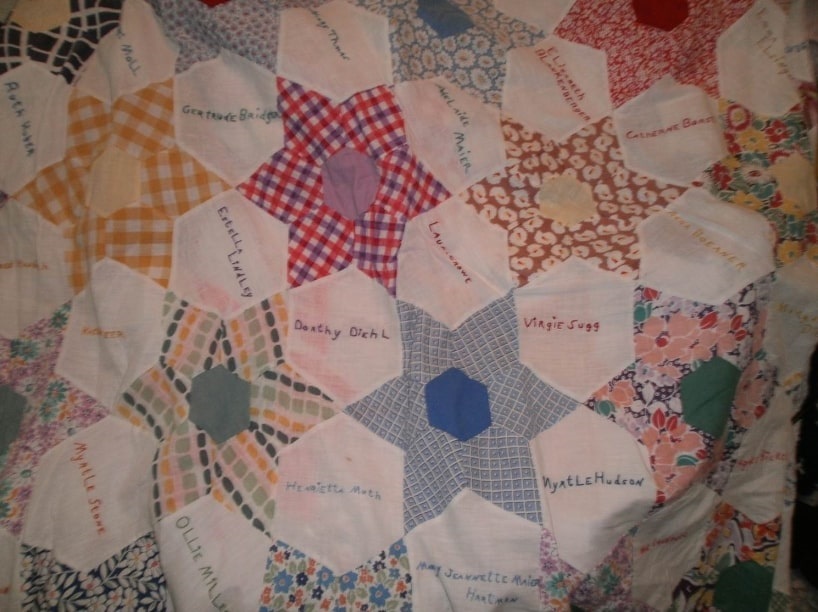
Searching their names in old newspapers provided me with articles about these individual women. In the case of Clara Gresham, the articles I found were, unfortunately, about her murder and the subsequent trial of her killer. But there’s a part of the larger story that most likely won’t be found by searching on the women’s names. The larger story involves their day-to-day lives at the place they worked: H. Fendrich Cigar Factory in Evansville, Indiana.
Cigars
Why would learning more about the cigar company where these women worked be important to my research? I want to go beyond just names and biographical information. I want to learn about their lives. Learning more about their work and where they worked is part of that. That way I can write up narratives about these women that go beyond a name and date, and really tell their stories.
What can I find if, instead of searching using their names, I search for keywords like the company they worked for, Fendrich? Knowing where they lived and worked allows me to narrow my search by that location. And since I know this work happened in the early 20th century, I can also narrow my results to a specific year range.
To start, I searched on the name Fendrich in the Keywords box of the GenealogyBank search engine and clicked on the Search button. That gave me over 57,000 results.
So, I need to narrow that down. To help do that, I can specify the state where the factory was located. If I choose Indiana, my results are down to over 37,000. Luckily for me, one of the ways I can further narrow these results is by the city of Evansville, so that cuts off another 1,000 results.
If I want, I can even narrow my search down by a specific newspaper title.
Because I know I am interested in the period from about 1920 to 1950, I’m going to further narrow the results by that time frame. I still have more than 9,000 results, but I’m going to start there and now I’m going to sort my results by Oldest Publication Date.
Here’s the problem: because I only used the name Fendrich in my search, I get results that are a mixture of cigar company mentions and also people with that surname. So, at this point I can further narrow these results by adding another keyword to include in my search: Cigar.
You may wonder why I didn’t search for Fendrich Cigar in the first place. I know from previous research that the company isn’t always listed as Fendrich Cigar in the newspaper, so I wanted to make sure I wasn’t narrowing my results too much.
So now I am down to over 3,000 results. I’m going to start going through some of these results to see what I can find that might help me better understand these women.
During this time period, Help Wanted Ads were segregated by gender and race. This 1920 ad is in the Female Help Wanted column and promises beginners that they can get paid while they learn cigar making.
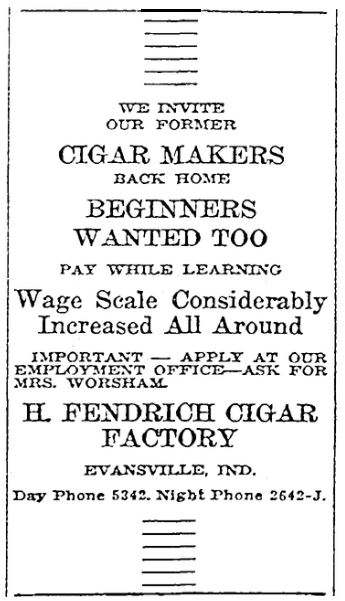
Aside from classified Help Wanted advertisements, Fendrich also ran advertisements boasting about their working conditions for women and girls. Consider this 1920 ad:
“For a great many years we have given steady, profitable and agreeable employment to thousands of women and girls. An ideal plant with plenty of daylight and ventilation, combining good working conditions. Noon day meals served in the plant.”
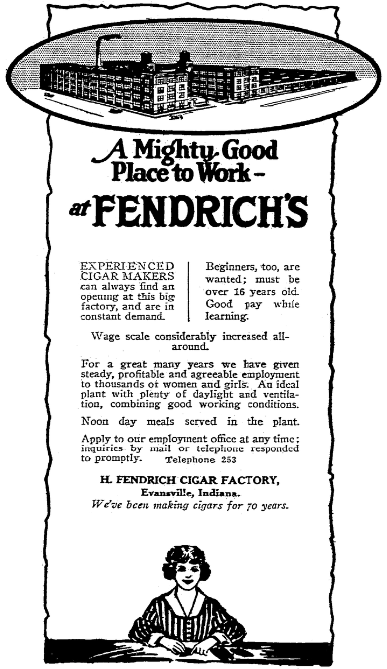
This gives me some great information about the working conditions (or at least what Fendrich said they were) for these women. Noon day meals meant that they didn’t need to pack food, or go home for lunch. This could have been a great savings and a nice perk for some women and girls who worked there. Clean and sanitary working conditions were important, especially when we look at working conditions women faced in big city factory work at that time.
In addition to the benefits Fendrich touted in its advertising, I discovered what was given to those employees who worked for Fendrich for 25 years or more. Although the photo is damaged in this next newspaper article, the caption explains that Cecelia Lindenschmidt was given a watch and bonus check for completing 50 years of service to the company. She is the sixth employee in the company’s 100-year history “to achieve a 50-year service record.” There is a “Fendrich 25-Year Service Club” at the factory.
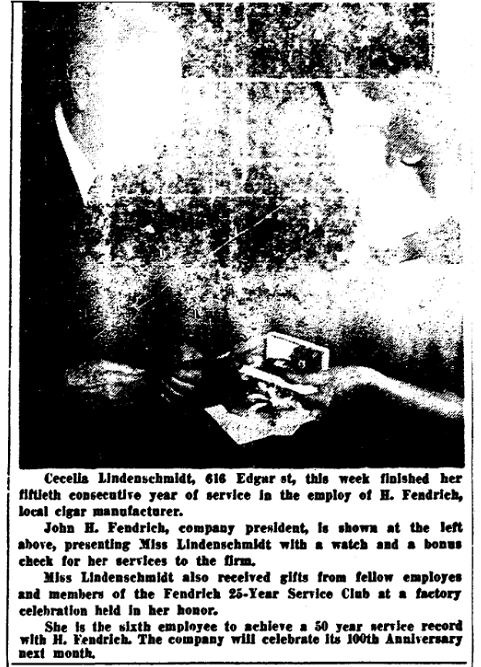
Besides working together, Fendrich employees enjoyed activities together outside of work, like this Halloween ball in 1935 given by the Employees Mutual Benefit Association of the H. Fendrich Cigar Company. This is one of a number of events I found in the local newspaper for Fendrich employees.
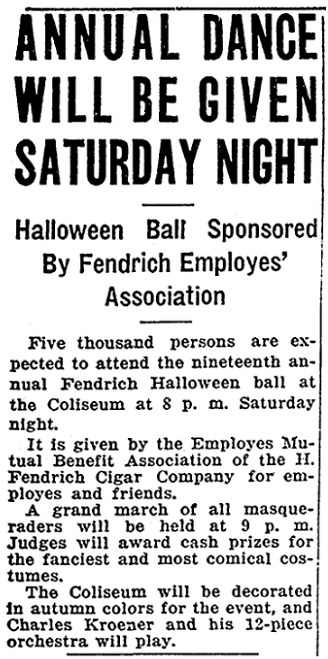
What Will You Find?
You get the point. Obviously, searching by an ancestor’s name is important for learning more specifics about their life and death. But to fill in the gaps and get a bigger picture of your ancestor’s life story, make sure to search by the name of the place she worked, where she attended church, or the organization she was a member of. Comprehensive newspaper research in a collection such as GenealogyBank’s Historical Newspaper Archives requires that we do more than a name search.

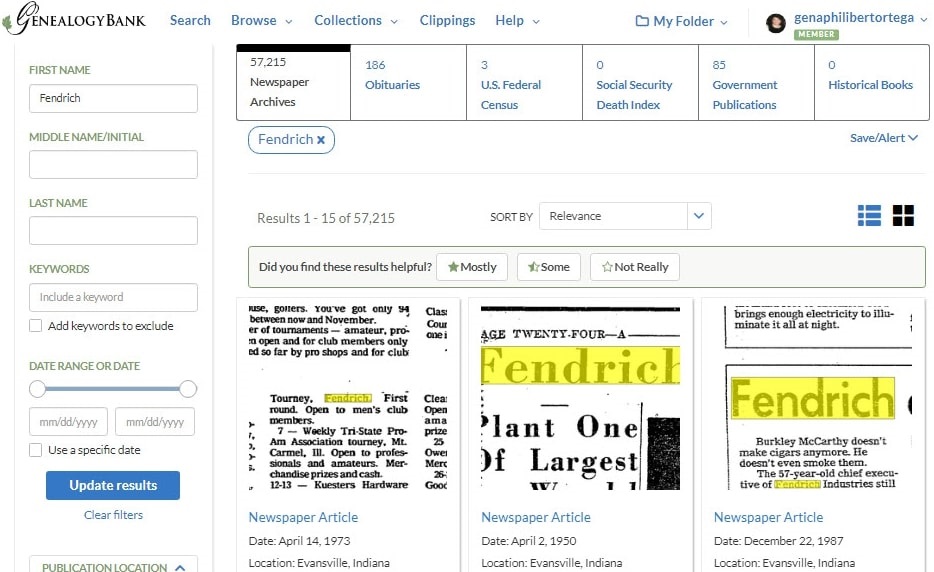
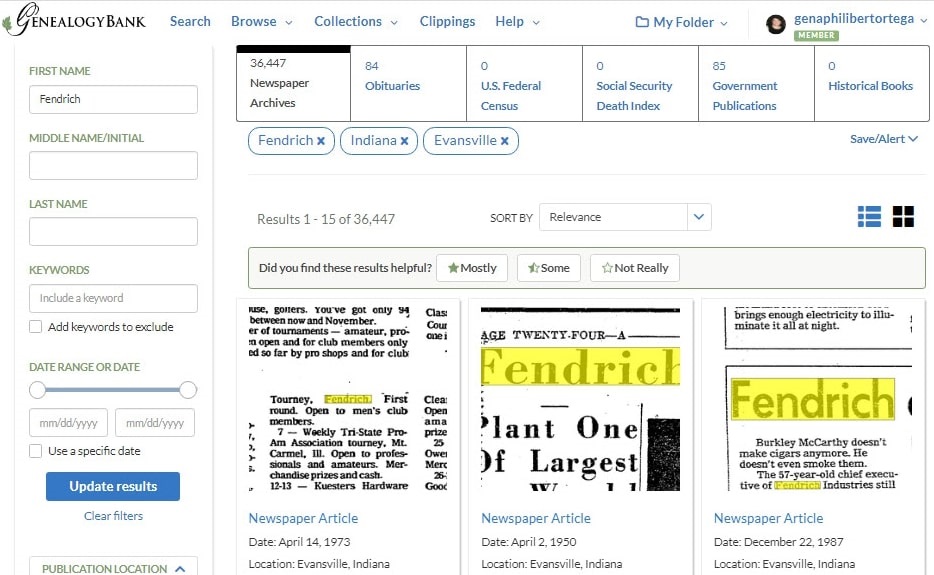
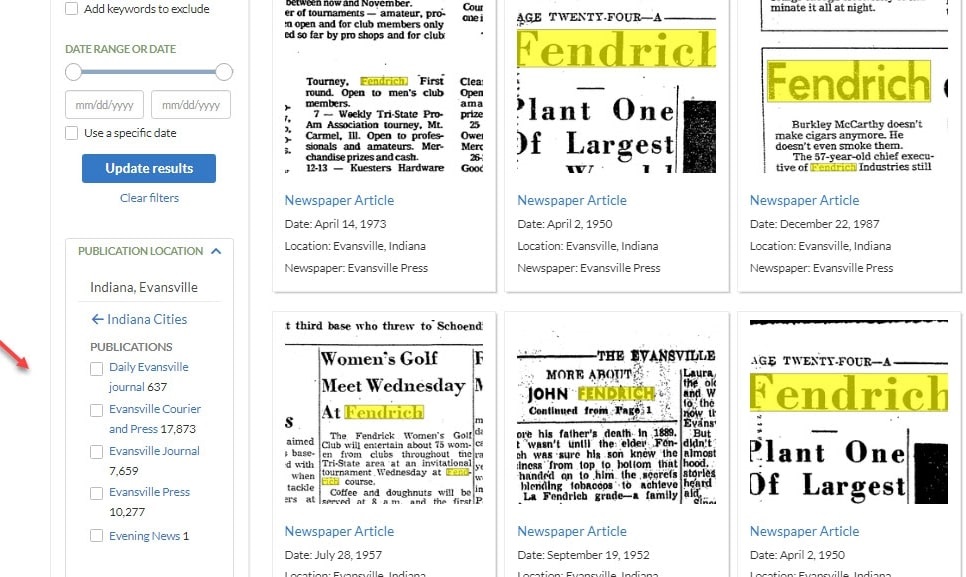
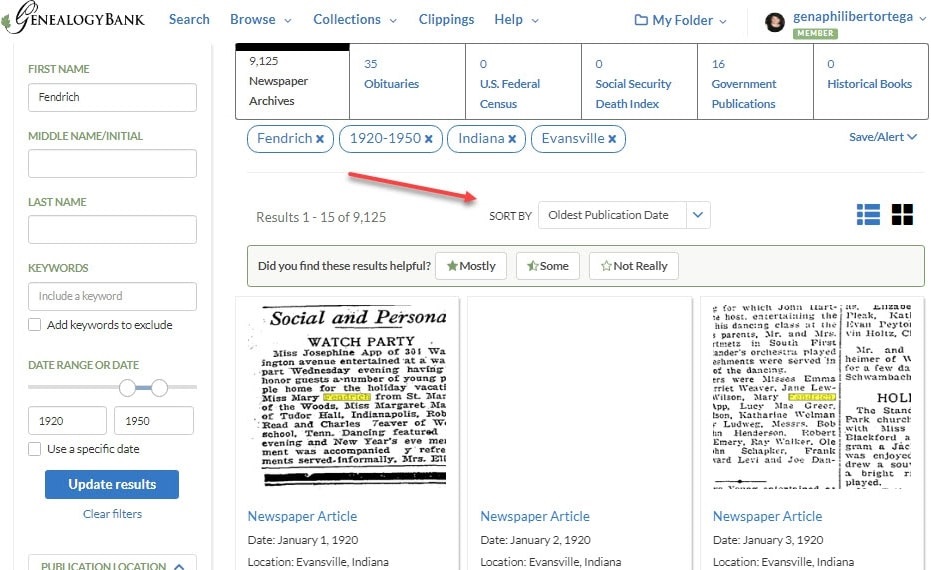
Thank you for sharing. Excellent research and storytelling. For my project, the woman worked at Steiger’s Department Store for 32 years.
Thank you for the very helpful research tips to tell the story of our ancestors’ daily lives. The articles you found on the Fendrich Cigar company were so interesting. Since the company employed a lot of people, a search with “Fendrich and obituaries” might help someone find a missing relative. The filtering tips for using GenealogyBank will also help me to get better results.
My mother worked at Whitman’s Candy in Camden, NJ, before her marriage to my father in 1940. She had three weeks to train her replacement; Whitman’s did not want married women working. Several years ago, I discovered that William Simpson Doughten Sr., a third cousin on my father’s side, was a “superintendent of a candy factory” in Camden, according to the 1910 census. Your article, Gena, put a burr under my saddle. Time to do more research on working conditions in Whitman’s.